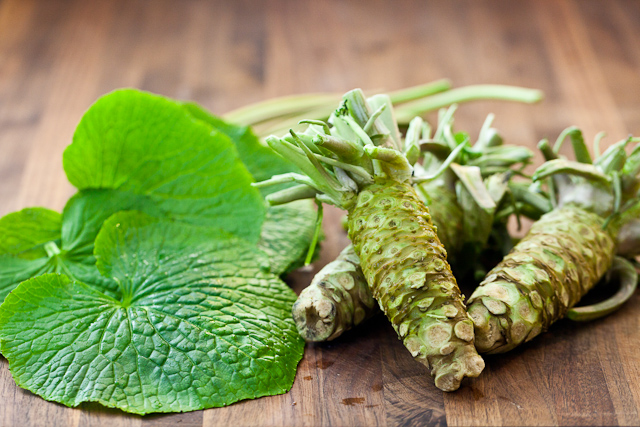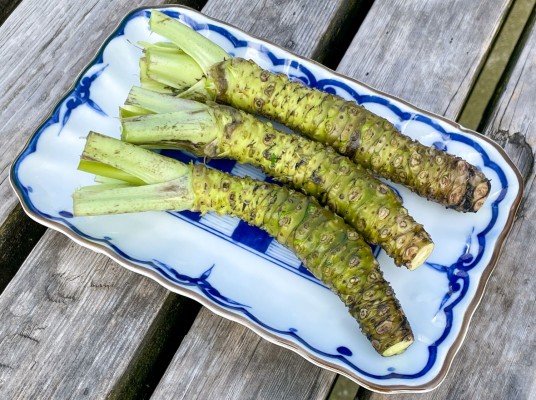When you eat sushi, you would definitely need wasabi on top of the fish as garnishing. Wasabi, a plant-based dish is loaded with cancer-fighting antioxidants, making it a healthy dish for humans. Wasabi belongs to the Brassicaceae family, and it is almost similar to the mustard and horseradish plants that you may already know.
Today, the wasabi that you buy from supermarkets, is made from horseradish and mustard. It is then given an edible dye of green shade, to make it look authentic and natural. These store-bought wasabis are way spicier than the original wasabi that you will find in the wild. Wasabi is now becoming a popular snack among youngsters worldwide.
This article will tell you more about feeding wasabi to cats and if it is safe to do so. If you have a cat and are confused about charting its diet plan, this article will tell you if you have to include wasabi in that plan or not.
Can cats eat wasabi? The simple answer to this question is no. While they can eat a very small quantity of wasabi, it is not recommended to feed them large quantities, as wasabi doesn’t contain any nutritional value for felines.
Are cats attracted to wasabi?

Luckily, most cats don’t like the smell of wasabi. They may want to eat it out of curiosity. When they watch you eating wasabi as a garnish over your sushi dish, they are curious to know what it is and what it tastes like. If you give a mall pea-sized quantity of wasabi to cats, they will eat it, and definitely show strange reactions, as the smell and taste of wasabi repels them.
You will not have any difficulty keeping cats away from wasabi, as the animals will stay away from this dish voluntarily. They will never come back for a second helping, and sometimes, they may even spit the wasabi that they have ingested.
Wasabi contains a compound known as isothiocyanate. This is what lends the spicy flavors to the wasabi and makes it tasty and healthy for humans. Foods containing isothiocyanates are known to have cancer-fighting and bacteria-fighting properties. Some of the other healthy foods that contain this compound are Brussels Sprouts, turnips, mustard greens, cabbage, kale, and the like. While it is healthy for humans, the same cannot be said about cats.
This compound acts as a repellent and keeps cats away from wasabi. It is very rare to find a cat that likes the smell of wasabi. Since cats will never go near wasabi, you can easily keep them away from this non-nutritious dish very easily. The next time you eat wasabi, you will be surprised to note that your cat is no more curious about what you eat because it has a bitter experience tasting wasabi the first time!
Will cats die if they eat wasabi?
No, wasabi doesn’t cause death in cats. They don’t contain any lethal ingredients that are highly toxic for cats. Yes, the ingredients in wasabi may not be acceptable to the digestive system of cats, but it doesn’t lead to death. The most discomfort that your cat may experience after having wasabi is irritating or pain in the stomach. It may want to get the wasabi out of its system as quickly as possible. So, vomiting and diarrhea are some common reactions that you can expect if your cats have eaten a reasonable quantity of wasabi.
If your cat has eaten very little wasabi, you have nothing to worry about. They will never come back again to eat more. Therefore, you can ensure that cats will not suffer from any toxic or allergic reactions due to wasabi. If in the rarest of rare occasions, your cats do consume a sizeable quantity of wasabi, (about the size of a big pea), they may feel lethargic for a while due to the pain or discomfort in their stomach. However, you don’t have to worry. They will stabilize automatically after a while, and they go on with their normal routine.
What to note about giving wasabi to cats

Do you usually buy the store-bought, readymade, flavorful wasabi for garnishing your sushi? IF yes, you have to be extra careful around your pet. Ensure that your pet doesn’t come anywhere close to flavorful wasabi because the additional flavors used in this dish can be quite lethal for them.
Wasabi that contains onion powder or garlic powder is extremely toxic for cats, as the compounds in these powders can cause fatal reactions in cats. Felines shouldn’t be exposed even to very small amounts of onion or garlic. When you buy wasabi packets, please check the ingredients on the packet very carefully.
If these are plain wasabis without any artificial colors or additional flavors, you can allow your cat to lick a small pea-sized dose of wasabi to see if it likes it. However, if you use flavored wasabis, you should not let your cat anywhere near when you are eating, avoiding accidental ingestion of toxic elements.
How to know if your cat has eaten a lot of wasabi?
Please don’t panic. What we mean by “a lot of wasabi” here is nothing but a medium pea-sized amount. Cats are very sensitive to taste and smell. Therefore, they will never come back to eat wasabi again if they know how it tastes. However, in the first instance itself, if your cat has eaten more wasabi than it should have, you will notice the following symptoms:
- Excessive urge to urinate and drink water
- Discomfort in the abdomen
- Vomiting
- Diarrhea
- Rubbing itself or rolling over the ground to get the taste and smell of wasabi away from its body
Final Word
While wasabi isn’t exactly dangerous for cats, you shouldn’t give them to cats at all. Wasabi doesn’t contain any proteins that cats need. Since they are carnivorous animals, cats cannot handle plant-based wasabi properly. So they can develop stomach upsets if they consume too much wasabi in one go. However, the good thing is that the smell and taste of wasabi repel cats so much that they never come again to eat wasabi for a second time. So, your pets are safe around wasabi.